Answered step by step
Verified Expert Solution
Question
1 Approved Answer
MILES Case Study Directions: For your FBA assignment, use the brief description, functional assessment interviews from the teacher, and the ABC data collected in
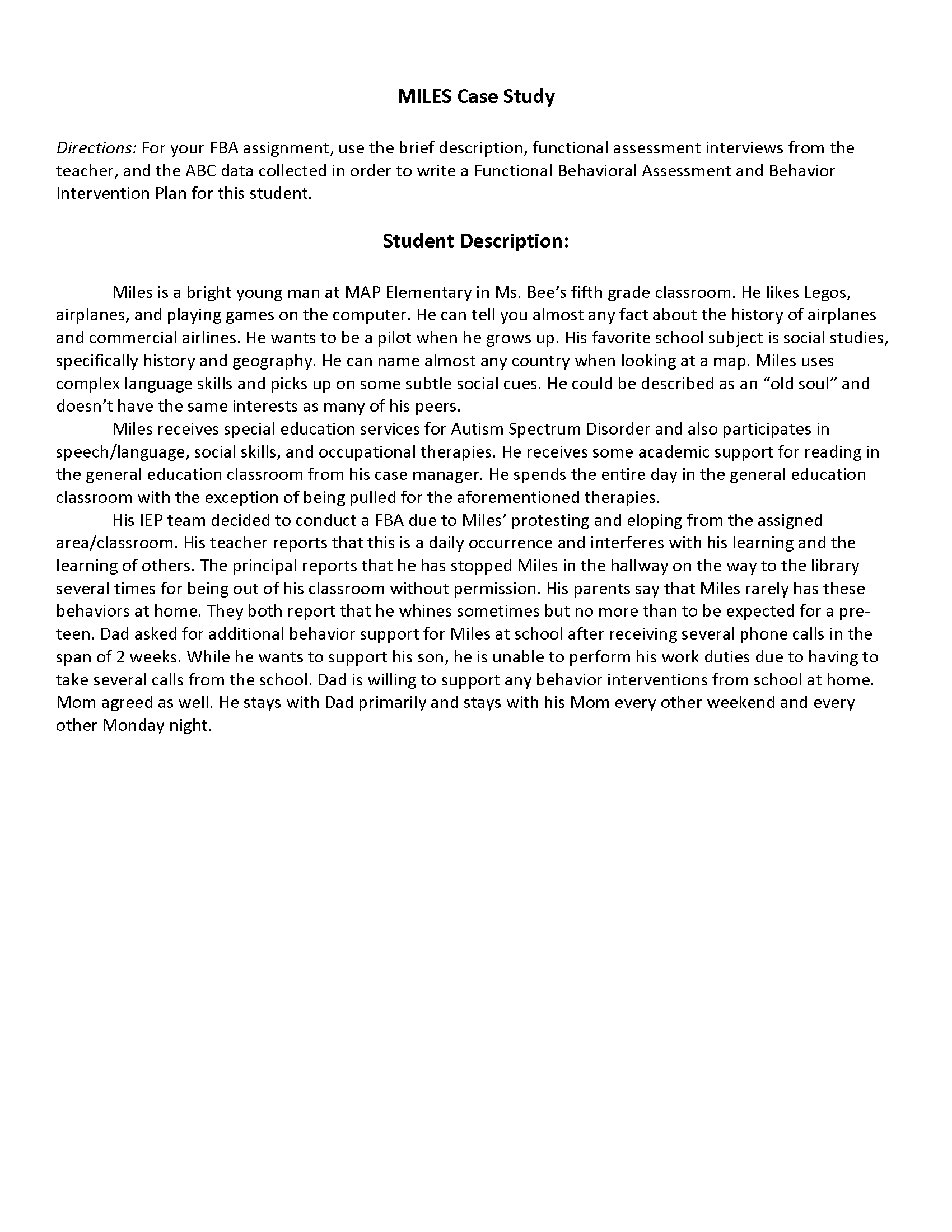
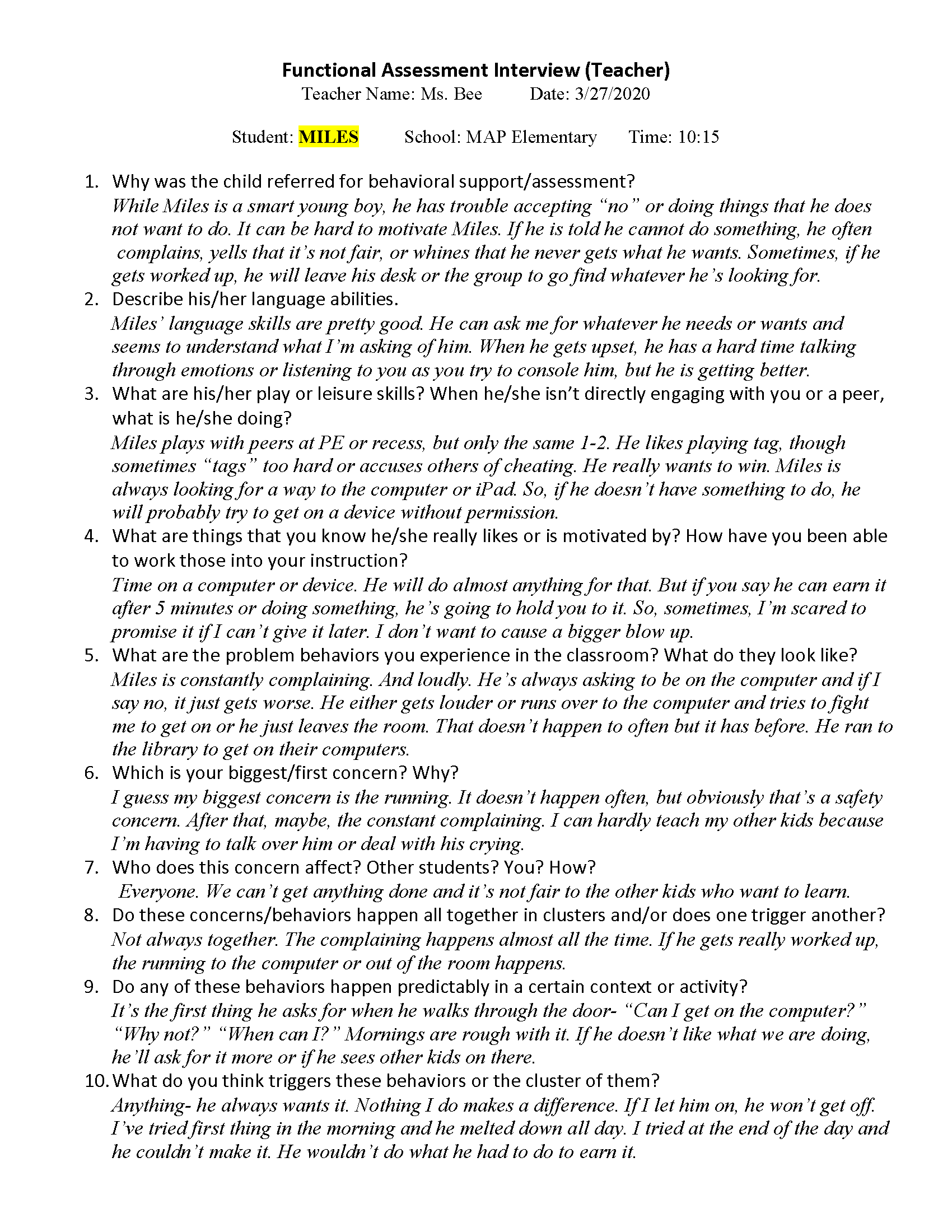
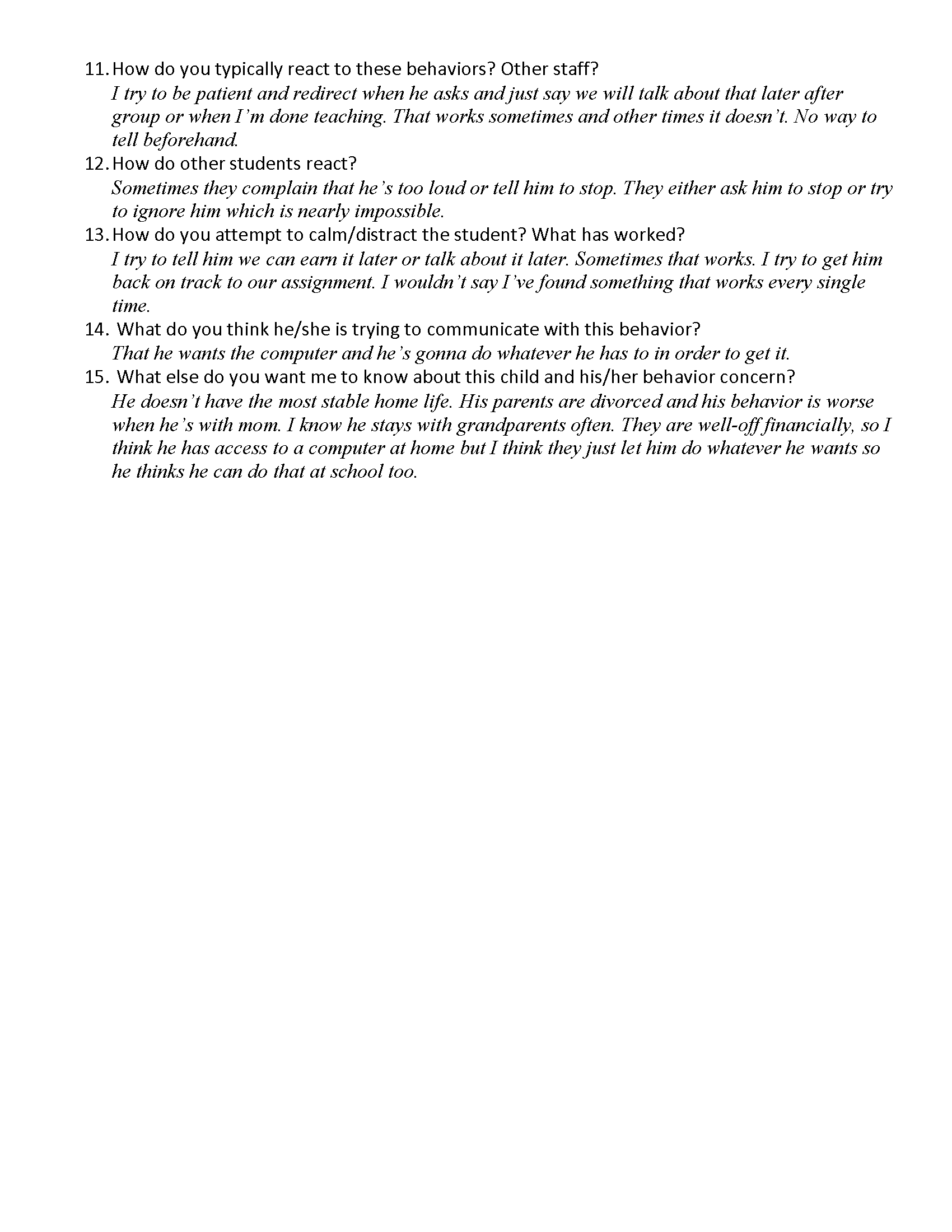
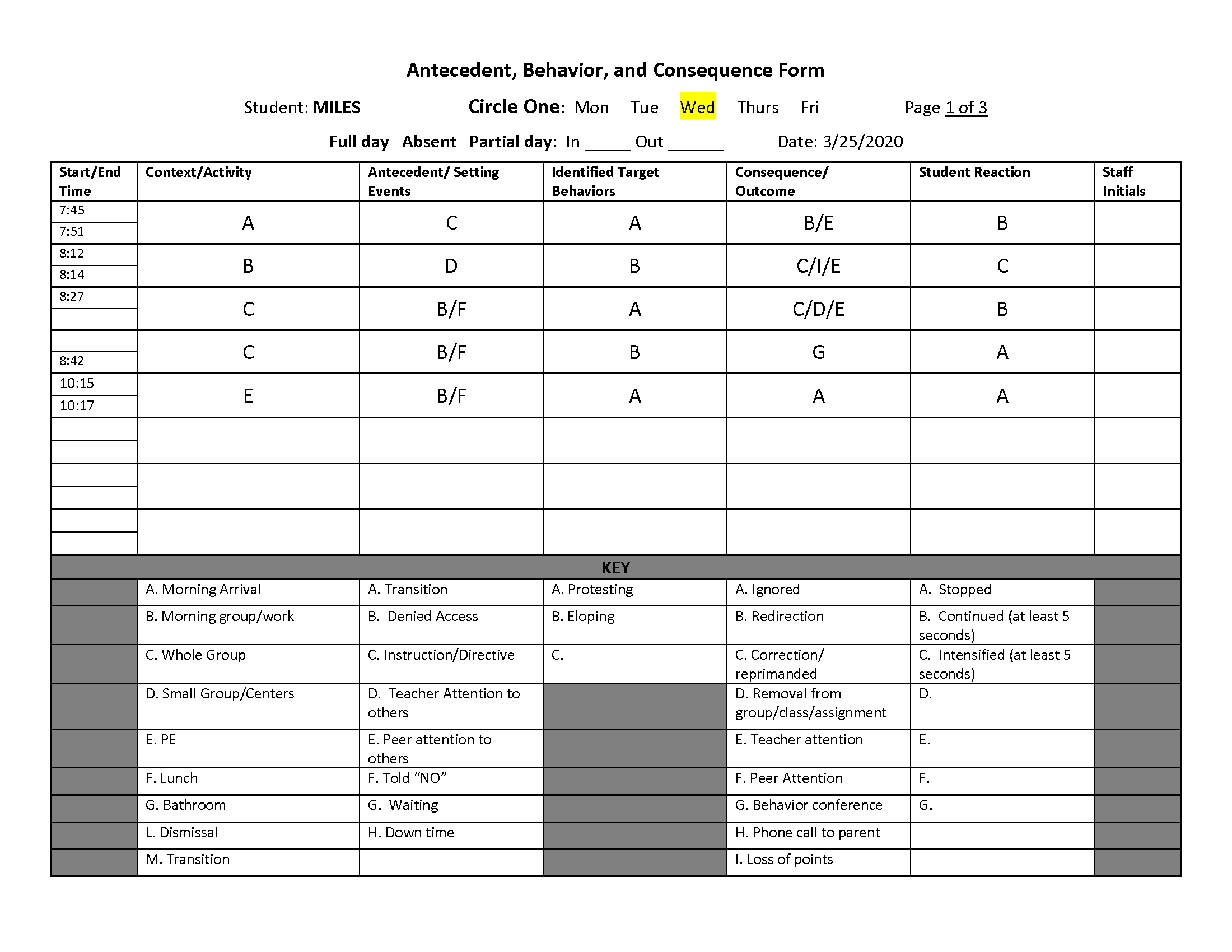
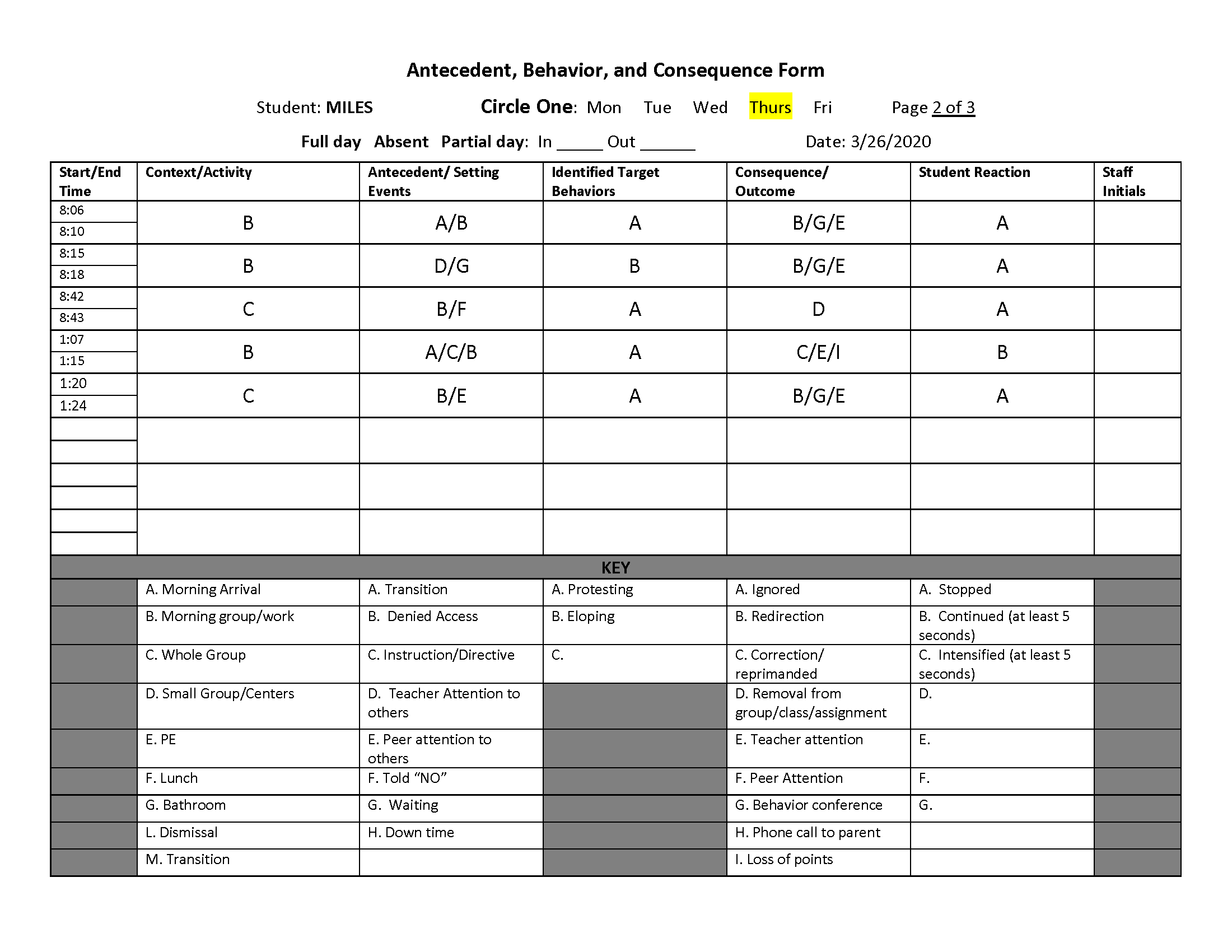
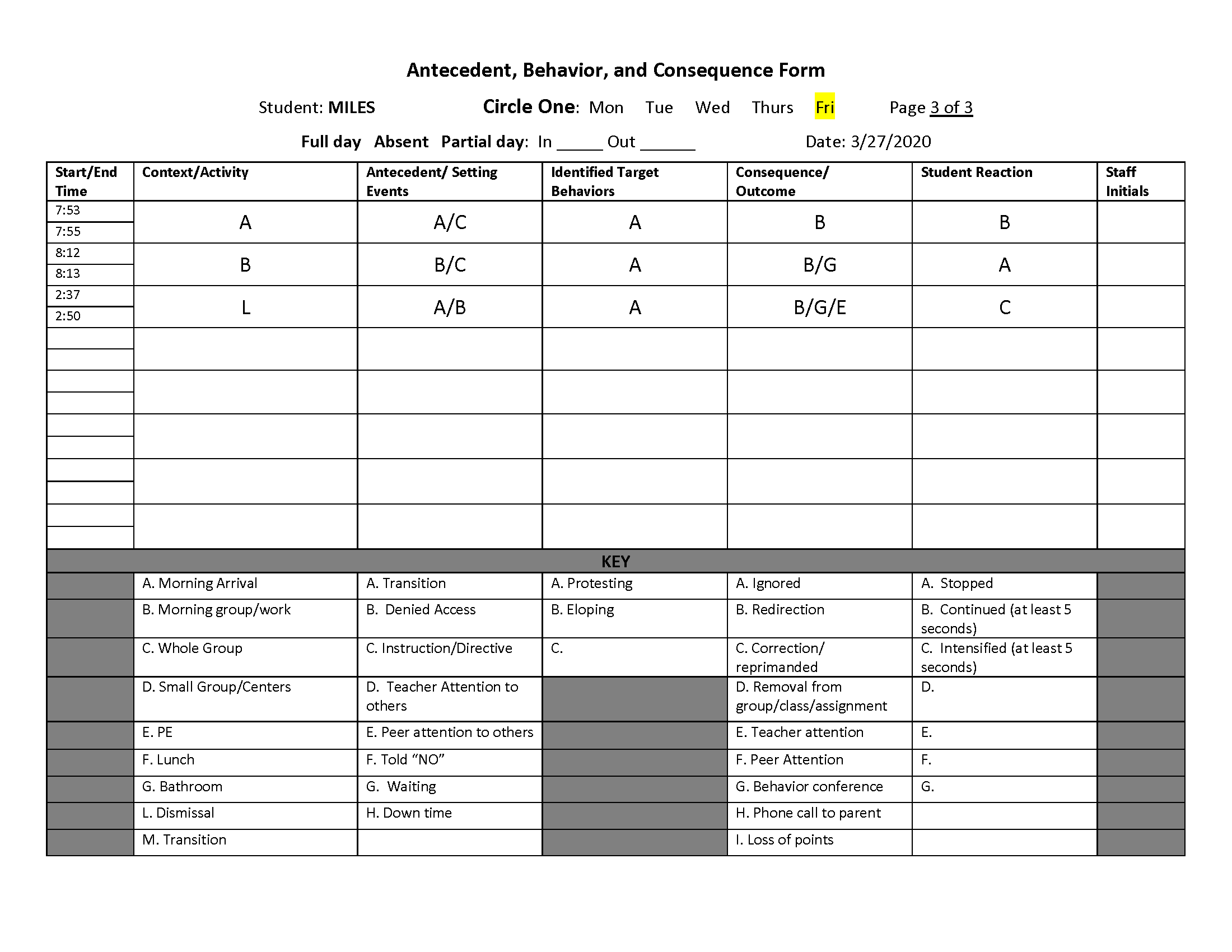
MILES Case Study Directions: For your FBA assignment, use the brief description, functional assessment interviews from the teacher, and the ABC data collected in order to write a Functional Behavioral Assessment and Behavior Intervention Plan for this student. Student Description: Miles is a bright young man at MAP Elementary in Ms. Bee's fifth grade classroom. He likes Legos, airplanes, and playing games on the computer. He can tell you almost any fact about the history of airplanes and commercial airlines. He wants to be a pilot when he grows up. His favorite school subject is social studies, specifically history and geography. He can name almost any country when looking at a map. Miles uses complex language skills and picks up on some subtle social cues. He could be described as an "old soul" and doesn't have the same interests as many of his peers. Miles receives special education services for Autism Spectrum Disorder and also participates in speech/language, social skills, and occupational therapies. He receives some academic support for reading in the general education classroom from his case manager. He spends the entire day in the general education classroom with the exception of being pulled for the aforementioned therapies. His IEP team decided to conduct a FBA due to Miles' protesting and eloping from the assigned area/classroom. His teacher reports that this is a daily occurrence and interferes with his learning and the learning of others. The principal reports that he has stopped Miles in the hallway on the way to the library several times for being out of his classroom without permission. His parents say that Miles rarely has these behaviors at home. They both report that he whines sometimes but no more than to be expected for a pre- teen. Dad asked for additional behavior support for Miles at school after receiving several phone calls in the span of 2 weeks. While he wants to support his son, he is unable to perform his work duties due to having to take several calls from the school. Dad is willing to support any behavior interventions from school at home. Mom agreed as well. He stays with Dad primarily and stays with his Mom every other weekend and every other Monday night. Functional Assessment Interview (Teacher) Teacher Name: Ms. Bee Date: 3/27/2020 Student: MILES School: MAP Elementary Time: 10:15 1. Why was the child referred for behavioral support/assessment? While Miles is a smart young boy, he has trouble accepting "no" or doing things that he does not want to do. It can be hard to motivate Miles. If he is told he cannot do something, he often complains, yells that it's not fair, or whines that he never gets what he wants. Sometimes, if he gets worked up, he will leave his desk or the group to go find whatever he's looking for. 2. Describe his/her language abilities. Miles' language skills are pretty good. He can ask me for whatever he needs or wants and seems to understand what I'm asking of him. When he gets upset, he has a hard time talking through emotions or listening to you as you try to console him, but he is getting better. 3. What are his/her play or leisure skills? When he/she isn't directly engaging with you or a peer, what is he/she doing? Miles plays with peers at PE or recess, but only the same 1-2. He likes playing tag, though sometimes "tags" too hard or accuses others of cheating. He really wants to win. Miles is always looking for a way to the computer or iPad. So, if he doesn't have something to do, he will probably try to get on a device without permission. 4. What are things that you know he/she really likes or is motivated by? How have you been able to work those into your instruction? Time on a computer or device. He will do almost anything for that. But if you say he can earn it after 5 minutes or doing something, he's going to hold you to it. So, sometimes, I'm scared to promise it if I can't give it later. I don't want to cause a bigger blow up. 5. What are the problem behaviors you experience in the classroom? What do they look like? Miles is constantly complaining. And loudly. He's always asking to be on the computer and if I say no, it just gets worse. He either gets louder or runs over to the computer and tries to fight me to get on or he just leaves the room. That doesn't happen to often but it has before. He ran to the library to get on their computers. 6. Which is your biggest/first concern? Why? I guess my biggest concern is the running. It doesn't happen often, but obviously that's a safety concern. After that, maybe, the constant complaining. I can hardly teach my other kids because I'm having to talk over him or deal with his crying. 7. Who does this concern affect? Other students? You? How? Everyone. We can't get anything done and it's not fair to the other kids who want to learn. 8. Do these concerns/behaviors happen all together in clusters and/or does one trigger another? Not always together. The complaining happens almost all the time. If he gets really worked up, the running to the computer or out of the room happens. 9. Do any of these behaviors happen predictably in a certain context or activity? It's the first thing he asks for when he walks through the door- "Can I get on the computer?" "Why not?" "When can I?" Mornings are rough with it. If he doesn't like what we are doing, he'll ask for it more or if he sees other kids on there. 10. What do you think triggers these behaviors or the cluster of them? Anything- he always wants it. Nothing I do makes a difference. If I let him on, he won't get off. I've tried first thing in the morning and he melted down all day. I tried at the end of the day and he couldn't make it. He wouldn't do what he had to do to earn it. 11. How do you typically react to these behaviors? Other staff? I try to be patient and redirect when he asks and just say we will talk about that later after group or when I'm done teaching. That works sometimes and other times it doesn't. No way to tell beforehand. 12. How do other students react? Sometimes they complain that he's too loud or tell him to stop. They either ask him to stop or try to ignore him which is nearly impossible. 13. How do you attempt to calm/distract the student? What has worked? I try to tell him we can earn it later or talk about it later. Sometimes that works. I try to get him back on track to our assignment. I wouldn't say I've found something that works every single time. 14. What do you think he/she is trying to communicate with this behavior? That he wants the computer and he's gonna do whatever he has to in order to get it. 15. What else do you want me to know about this child and his/her behavior concern? He doesn't have the most stable home life. His parents are divorced and his behavior is worse when he's with mom. I know he stays with grandparents often. They are well-off financially, so I think he has access to a computer at home but I think they just let him do whatever he wants so he thinks he can do that at school too. Antecedent, Behavior, and Consequence Form Student: MILES Circle One: Mon Tue Wed Thurs Fri Page 1 of 3 Full day Absent Partial day: In Out Date: 3/25/2020 Start/End Context/Activity Antecedent/Setting Time Events Identified Target Behaviors Consequence/ Student Reaction Staff Outcome Initials 7:45 A C A B/E B 7:51 8:12 B D B C/I/E C 8:14 8:27 C B/F A C/D/E B C B/F B A 8:42 10:15 E B/F A A A 10:17 A. Morning Arrival A. Transition B. Morning group/work B. Denied Access C. Whole Group C. Instruction/Directive D. Small Group/Centers D. Teacher Attention to others E. PE F. Lunch G. Bathroom L. Dismissal M. Transition E. Peer attention to others F. Told "NO" G. Waiting H. Down time KEY A. Ignored A. Protesting B. Eloping C. B. Redirection C. Correction/ reprimanded D. Removal from group/class/assignment A. Stopped B. Continued (at least 5 seconds) C. Intensified (at least 5 seconds) D. E. Teacher attention E. F. Peer Attention F. G. Behavior conference G. H. Phone call to parent I. Loss of points Antecedent, Behavior, and Consequence Form Student: MILES Circle One: Mon Tue Wed Thurs Fri Page 2 of 3 Full day Absent Partial day: In Out Date: 3/26/2020 Start/End Context/Activity Antecedent/Setting Identified Target Consequence/ Student Reaction Staff Time Events Behaviors Outcome Initials 8:06 B A/B A B/G/E A 8:10 8:15 B D/G B B/G/E A 8:18 8:42 C B/F A D A 8:43 1:07 B A/C/B A C/E/I B 1:15 1:20 C B/E A B/G/E A 1:24 KEY A. Morning Arrival A. Transition B. Morning group/work B. Denied Access A. Protesting B. Eloping A. Ignored C. Whole Group C. Instruction/Directive C. C. Correction/ D. Small Group/Centers D. Teacher Attention to others B. Redirection reprimanded D. Removal from group/class/assignment A. Stopped B. Continued (at least 5 seconds) C. Intensified (at least 5 seconds) D. E. PE F. Lunch G. Bathroom L. Dismissal M. Transition E. Peer attention to others F. Told "NO" G. Waiting H. Down time E. Teacher attention E. F. Peer Attention F. G. Behavior conference G. H. Phone call to parent I. Loss of points Antecedent, Behavior, and Consequence Form Student: MILES Circle One: Mon Tue Wed Thurs Fri Page 3 of 3 Full day Absent Partial day: In Out Date: 3/27/2020 Start/End Context/Activity Antecedent/Setting Identified Target Consequence/ Student Reaction Staff Time Events Behaviors Outcome Initials 7:53 A A/C A B B 7:55 8:12 B/C A B/G A 8:13 2:37 L A/B A B/G/E C 2:50 KEY A. Morning Arrival A. Transition A. Protesting A. Ignored B. Morning group/work B. Denied Access B. Eloping B. Redirection C. Whole Group D. Small Group/Centers E. PE F. Lunch G. Bathroom L. Dismissal M. Transition C. Instruction/Directive D. Teacher Attention to others E. Peer attention to others F. Told "NO" G. Waiting H. Down time C. C. Correction/ reprimanded D. Removal from group/class/assignment A. Stopped B. Continued (at least 5 seconds) C. Intensified (at least 5 seconds) D. E. Teacher attention E. F. Peer Attention G. Behavior conference F. G. H. Phone call to parent I. Loss of points
Step by Step Solution
There are 3 Steps involved in it
Step: 1

Get Instant Access to Expert-Tailored Solutions
See step-by-step solutions with expert insights and AI powered tools for academic success
Step: 2

Step: 3

Ace Your Homework with AI
Get the answers you need in no time with our AI-driven, step-by-step assistance
Get Started


